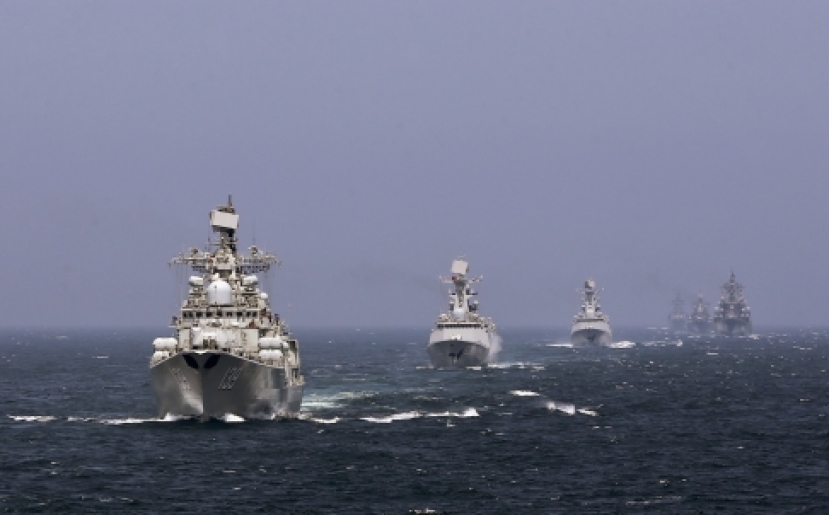China and Russia: just diplomatic friends with military benefits
11.05.2015 15:31
 China and Russia: just diplomatic friends with military benefits
China and Russia: just diplomatic friends with military benefits
The two countries are not about to make their bilateral relationship a formal alliance, analysts say.
China and Russia are not planning to have any formal military alliance, say military and Sino-Russian analysts, despite significant ongoing cooperation between the neighbours ahead of President Xi Jinping’s three-day trip to Moscow from Friday.
The strengthening of military and diplomatic ties between Beijing and Moscow has been encouraged by their common past and present-day containment by the West, but the fallout from the Sino-Soviet split in 1969 was a reminder to officials on both sides “not to repeat any historical tragedies by forming any alliance”, said Tian Chunsheng, an analyst at the State Council’s Russian Development Research Centre.
In the late 1950s, different interpretations of Marxism led then-Chinese leader Mao Zedong and his Russian counterpart premier Nikita Khrushchev to move from being “publicly international allies” to “privately ideological enemies”.
Bilateral ties suddenly deteriorated in 1969 when Moscow withdrew all Russian financial aid and technical experts from China.
Much has changed since then but “the present intensive military cooperation between China and Russia doesn’t mean they will build up, or form any official military alliance”, Tian said.
“Setting up a state organisation, such as Nato, would violate the two countries’ fundamental principles,” he said.
“They do not want to repeat the painful experience of the cold war, when China was regarded as a member of the Warsaw Pact [a defensive treaty agreed by European communist states] led by the former Soviet Union.
“Both Beijing and Moscow suffered a lot because of the ups and downs in their bilateral relationship during the 1960s and 1990s.”
Even though the two countries are forging closer ties – they will stage a joint naval drill in the Mediterranean Sea this month and have signed arms deals – the joint efforts are founded on mutual dismay at the actions of the United States, rather than a shared desire for an alliance, analysts say.
Beijing has been rankled by Washington’s presence in Asia, while Moscow has been angered by US-led sanctions in response to its 2014 annexation of Crimea from Ukraine.
Antony Wong Dong, a Macau-based military observer, said Beijing and Moscow would simply try to maintain a “collaborative relationship” amid the containment efforts of the US and its allies.
“Beijing and Moscow remain friends because so far they have had no reason to break their ties in the face of all the actions of the Western allies,” Wong said.
China and Russia are expected to sign deals on energy, infrastructure and military cooperation during Xi’s visit.
Sino-Russia relations are at their warmest since the collapse of the former Soviet Union in 1991, with Beijing and Moscow reaching agreement in the past year on three of the largest arms deals for more than a decade, including the purchase of 24 Sukhoi Su-35 jet fighters, six S-400 anti-aircraft missile systems, and the Kremlin’s promise to develop a fifth-generation Kalina-class conventional submarine for the People’s Liberation Army navy.
“All the weapons Russia is going to sell to China are the most advanced arms used by the Russian army, indicating the close relationship between the two countries,” Beijing-based retired PLA major general Xu Guangyu said.
“The Su-35, the Russian air force’s latest generation multirole fighter jet, is scheduled to be delivered to China from 2017, while the sale of S-400 missile systems also includes the provision of electronic communication software technologies.”
Negotiations over the arms deals have gone on for years, but were finalised after Xi came to power.
Instead of providing the PLA with older Lada-class submarines, as Beijing had requested, Russian President Vladimir Putin was likely to authorise China to receive the more advanced Kalina-class submarines, Vassily Kashin, a senior research fellow at the Moscow-based Centre for Analysis of Strategies and Technologies, was quoted as saying in March by Radio Sputnik, the Russian government’s official radio news service.
The Kalina-class contractor reported that Russia’s most advanced conventional submarine was equipped with an air-independent propulsion system that allowed the vessel to operate underwater for much longer periods and be more difficult to detect.
